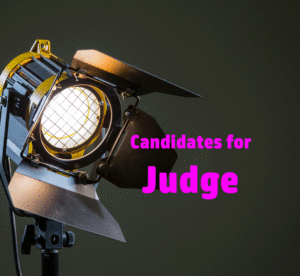Judicial Races In Arkansas Spotlight
 In many parts of the state judicial races are getting a lot more attention than normal. At least that is the impression we get from seeing conservatives talk about the races on social media, such as Facebook and Twitter.
In many parts of the state judicial races are getting a lot more attention than normal. At least that is the impression we get from seeing conservatives talk about the races on social media, such as Facebook and Twitter.
We’ve noticed three types of posts about the judicial races:
- Announcements of where the judicial candidates will be speaking;
- Statements of support for a candidate; and
- Warnings of a candidate’s bias. For example, a Facebook user warned of a judicial candidate’s bias by reposting the candidate’s own pictures of when he participated in a rally of the anti-gun group “Moms Demand Action.”
Although judicial races are nonpartisan races, the election of judges occurs at the same time as the political party primaries. Unless there is a runoff, judges will be elected on March 3, 2020 but not take office until January 1, 2021, almost ten months after the election. (Early voting begins February 17th.)
If you vote in the Republican or Democrat primary, your ballot will include your nonpartisan judicial candidates. If you don’t want to vote in either party’s primary, you can still vote in the judicial race by requesting a non-partisan ballot which is for the judicial races.
We would like to think people are paying more attention to judicial races because they have seen the damage done in places like California by activist judges who make the law not interpret it.
But the extra attention could also be due to the lack of many other races on the primary ballot.
The big race this March 3rd is for the political party nomination for President of the United State. But voters will see far fewer races in the primaries this year.
- State-wide executive branch offices, such as Governor, Lt. Governor, and Secretary of State, are not on the ballot this time. These offices have four-year terms and will not be on the ballot until 2022.
- County officers also have four-year terms and are not up for election this time.
- Across the state there will be only a few primary races for State Representative and State Senate seats. Gone are the days when at least a third of the House of Representative seats and many Senate seats were open seats because of term limits. Under term limits it used to be that a person could only serve three two-year terms as a Representative and two four-year terms in the Senate. A sixteen-year term limit[i] was added into an ethics amendment and has resulted in few primary contests for legislative races, especially where there is an incumbent running for reelection.
Whatever the reason, judicial candidates in many areas of the state are getting more of the spotlight and the extra attention is a good thing.
* * * * *
Finding the list of candidates can be tricky so we are including a link to the Secretary of State’s website. Scroll down to the bottom and select “Sort by Position.” This will give you not only the judicial races but all the races from President down to state Representative and district court judge. VIEW LIST
[i] Ark. Const. Amendment 73, §2
